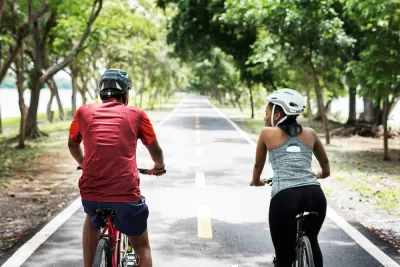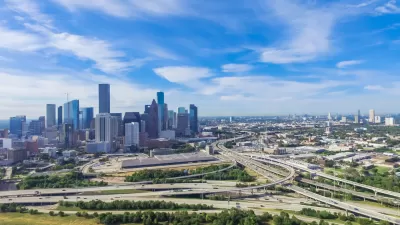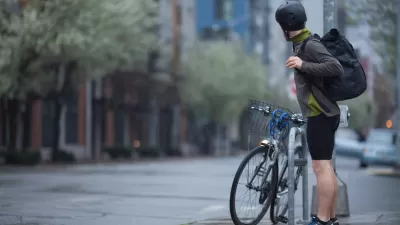A far-reaching new study highlights the disproportionate effect of biking and walking laws on the mobility of Black Americans.

An extensive new analysis of laws that impact vulnerable road users identifies “policies that evidence shows are being enforced in a racially discriminatory manner, or that have strong potential to be enforced in a racially discriminatory manner.” As Kea Wilson explains in Streetsblog, the research team, led by Charles T. Brown, used interviews in addition to the legal data to understand how the mobility of Black Americans is limited by discriminatory laws.
“Throughout the report, Brown and his colleagues cite a massive body of research that shows Black road users throughout the U.S. are significantly more likely than White road users to be policed for mobility-related infractions, to face violence and death at the hands of law enforcement when they’re stopped, and to live in communities that rely on fines and fees to support their municipal budgets, even though Black residents disproportionately struggle to pay them.” Furthermore, stops made under the pretense of safety—jaywalking, helmet laws, sidewalk bike riding laws—actually endanger pedestrians and people on bikes by forcing them onto unsafe infrastructure.
The report makes a few recommendations, such as supporting “dedicated infrastructure for vulnerable road users, not just as a tool to end traffic violence but a tool to prevent criminalized behavior like sidewalk riding and jaywalking and reduce the need for human enforcement” and encouraging bike manufacturers to include more safety equipment as built-in features. “The researchers’ final recommendation, though, may be the most important of all: that transportation leaders to analyze and address all the structural reasons why Black people experience arrested mobility anywhere they move.”
FULL STORY: How Bike/Walk Laws ‘Arrest’ the Mobility of Black Americans

Maui's Vacation Rental Debate Turns Ugly
Verbal attacks, misinformation campaigns and fistfights plague a high-stakes debate to convert thousands of vacation rentals into long-term housing.

Planetizen Federal Action Tracker
A weekly monitor of how Trump’s orders and actions are impacting planners and planning in America.

In Urban Planning, AI Prompting Could be the New Design Thinking
Creativity has long been key to great urban design. What if we see AI as our new creative partner?

King County Supportive Housing Program Offers Hope for Unhoused Residents
The county is taking a ‘Housing First’ approach that prioritizes getting people into housing, then offering wraparound supportive services.

Researchers Use AI to Get Clearer Picture of US Housing
Analysts are using artificial intelligence to supercharge their research by allowing them to comb through data faster. Though these AI tools can be error prone, they save time and housing researchers are optimistic about the future.

Making Shared Micromobility More Inclusive
Cities and shared mobility system operators can do more to include people with disabilities in planning and operations, per a new report.
Urban Design for Planners 1: Software Tools
This six-course series explores essential urban design concepts using open source software and equips planners with the tools they need to participate fully in the urban design process.
Planning for Universal Design
Learn the tools for implementing Universal Design in planning regulations.
planning NEXT
Appalachian Highlands Housing Partners
Mpact (founded as Rail~Volution)
City of Camden Redevelopment Agency
City of Astoria
City of Portland
City of Laramie





























